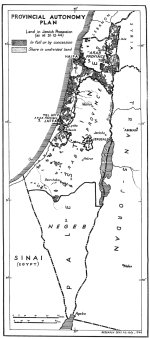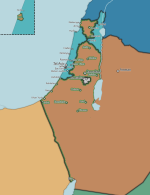The most likely end result of a non 1940 Fall of France is a 1941 Fall of France, so if there is an Israel or not depends primarily on what happens after that. Without the defeat of France within six weeks, the political climate in the U.S. is far different and there is obvious knock on effects with regards to the USSR with a delayed/cancelled Barbarossa. A Three Way (Probably eventually 4-way, given Japan) Cold War between the Anglo-Americans, Nazi Europe and Soviet Russia probably excludes an Israel, but a 1942 late Eastern Front can ensure it; just depends on if the Soviets bungle it or not. If so, again, can probably write off Israel but in the latter case it is assured and probably much stronger/populated than historically.
German supply lines were overstretched and shoestring. Germany also had debt well in excess of its GDP and ammunition stocks were depleting.
Without the insanely improbable fluke that was the quick folding of France OTL, Germany will have millions of men cut off from logistical support and the remainder will be pushed back into Germany proper. I would expect a coup attempt should the Western Allies make it into the Rhineland.
Even if Lend-Lease doesn't happen because of domestic American politics, there will still be destroyers-for-bases and
lend-lease [Edit: Cash and Carry]. The Daladier Proposal of colonies for right to purchase on credit also could be an option. I saw (unsourced) on the other website that the British considered the idea of colonies-for-credit too (the discussed colonies being Bahamas, Turks and Caicos, and Belize, with the US wanting to cede Belize to Mexico and Guatemala as part of the Good Neighbor policy).
If the war is several years shorter, Britain also will have a better fiscal and military circumstance. The exit from Palestine may occur later than 1948, and probably would be a more orderly one.
Perhaps this is what is produced. I
tinkered with this map I found online. Britain would be happy to make Jordan bigger rather than set up an Arab Nationalist state run by the Mufti.
View attachment 63993
Revisiting this, perhaps I was wrong. Yes, there were partition proposals in 1937-1938 OTL. Then there was the similar proposal in 1944 for a United Confederal Palestine with internal borders following similar lines. Then there was a 1946 proposal for a continued British mandate with two self-governing provinces along the above mentioned lines and the Negev and Jerusalem remaining British-controlled.
Without a protracted war, I question if the British would feel the need to urgently leave by 1948. There would continue to be immigration to Palestine, a defeat of Germany in 1940/1941 still means some 2.2 million Jews in Germany, Austria, Czechoslovakia, and non-Soviet Poland who have had everything stripped from them; plus the ~300,000 or so German Jews in the Netherlands, Belgium, and France who were still trying to figure out what to do next. And the Jews of the Arab World likewise would have already had a strong desire to migrate. It seems highly likely that there would be some degree of pressure upon Britain to let some of them into the Mandate (100,000 was the amount proposed historically) and there would be illegal immigration as well (which became bad optics for the British when they put Holocaust survivors attempting illegal immigration by sea in internment camps on Cyprus). 100,000 attempted to migrate illegally from 1939 to 1948, with half captured and put into camps in Cyprus and another 1600 dying at sea.

Furthermore, even a few years delay in the Palestine issue could result in a very big difference on the ground. In 1948 OTL, there already appeared to be emerging under the table discussions for an alliance of Jordan, Iraq, and Turkey against Syria, Saudi Arabia, and Egypt. As soon as Syria and Jordan gain independence in 1946, Abdullah called for the immediate unification of the two under him. He thought he'd have British support and support of the Syrian public which he felt had pan-Syrian sympathies. Many top Syrian officers may have been in contact with Abdullah or loyal to Abdullah. Abdullah wanted his Greater Syria, and was scheming with the Haurani Druze to rise up and serve as a basis for Transjordan to take Syria (as the Druze had already threatened to secede and join Jordan). The Syrian military was small and weak, but the Arab Legion (and the Druze Atrash) were organized and known for military prowess. For what it's worth, Abdullah reached out to the Druze
in Lebanon as well about setting up his proposed country. (
Source here).
No Fall of France (and thus Britain not having as much pressure to exit Palestine, as the war would prove far less costly) would likely mean Britain leaves Palestine later. Syria achieves independence around the same time as OTL, as a main source of the delay (a treaty was already negotiated OTL in 1936) was fear that an independent Syria would align with Nazi Germany. Nazi Germany has been defeated, and so Syria becomes independent. A Syrian-Jordanian War in 1947 or 1948 would mean the Arab State which most aggressively insisted on war (Syria) is run by the most conciliatory Arab Leader (Abdullah). It means a few more years of Jewish migration - and from a larger pool - and of arms being brought in. All of this suggests that compromise would win out over war if partition gets put on the table I think.



